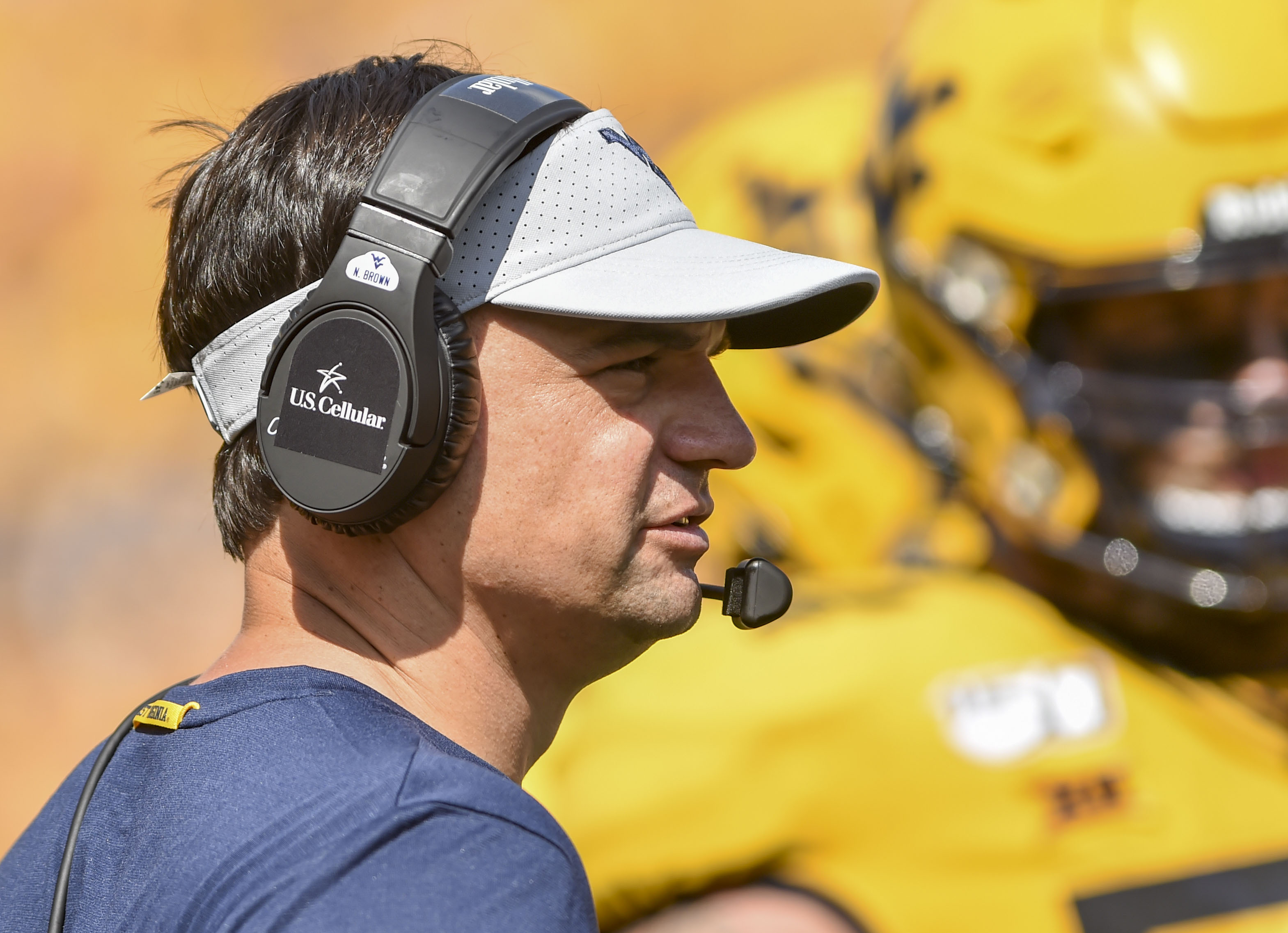MORGANTOWN, W.Va. — The dominoes are beginning to fall for the future of the college football season at the Power 5 level, and WVU coach Neal Brown is a firm believer that the season should still be played.
“I’m in the group that thinks we need football. I think it’s positive. I think we can do it in a safe environment. We do respect the virus, but I think we can make it work,” he said.
But if the powers that be decide otherwise, the last thing he wants to hear is “I don’t know” to what the next step is for his team and his players.
“I just want to know what the plan is if we don’t play,” Brown said Monday. “I want to know what to do with the 100 student-athletes that I have and at all these Power 5 schools and Group of 5 schools. How do we handle that? The reason I ask is because when we broke out of here in March and all sports ended, we didn’t have a plan because we didn’t see this coming. If we make the decision to not play — which I’m against — then we have to have a clear plan on how we’re going to move forward this semester with these guys.
“It can’t be, ‘Well we’re not playing, I don’t know, I don’t know, I don’t know.’ That doesn’t work. They’re tired of that. They’re tired of ‘I don’t knows.’ ”
On Monday, it was announced Big Ten presidents and administrators were meeting to discuss the possibility of canceling its football season, while the Pac-12 may not be far behind. The Big 12, SEC and ACC are waiting in the weeds to see what their next moves may be, and although no official announcements have been made about cancellations at the Power 5 level, it seems imminent a couple are close.
Brown stated repeatedly he’s tried to get his players to respect COVID-19 and possible health problems that could accompany it, but there are other factors that could arise if a season is not played.
Currently, the Mountaineers are scheduled to host Eastern Kentucky on Sept. 12 at Milan Puskar Stadium to begin their season.
“What we’re not talking about is what the collateral damage is when they have something they love taken away from them or when that discipline is taken away from them,” Brown said. “So if you take them out of their athletics, take them out of their structure, you take them out of what they really love … what happens? Because I’ve seen it. When we were not here for three months, I’ve seen it with our team. When decision-makers are making the decision, they have to think of the collateral damage, as well.”
WVU previously reported 28 total cases in July within the football program, but Brown said there are currently no active cases among players and staff for the first day of camp, which began Monday. Precautions continue to be taken, as they were during the OTA period for the last month, including separating practices into two teams — Blue and Gold — made up differently based on players who may live together or hang out off the field.
Another major concern for Brown is if a season is canceled, players would have to do football-related activities on their own.
“I will say this, for a good majority of it, if we’re not playing football, are they gonna get tested twice a week? Probably not,” Brown said. “If we’re not playing football, are they safer working out here than they are at home or at a local gym? Absolutely. I can answer those questions, but I don’t know what all 100 of them will do.”
Contact drills beginning are what many medical experts are concerned about with the possible transmission of sweat, saliva and breathing well within six feet of teammates and opponents.
However, Brown firmly believes WVU has taken all the necessary steps to insure the safety of players within his program. It will be up to the Big 12 to make sure protocols are similar for other programs in the conference.
“I feel really comfortable with what we’re doing with our players from a safety and COVID protocol standpoint,” Brown said. “Our testing has proven over the last few weeks. Like most things with this pandemic, we continue to get better at it. Zero cases coming into camp. We’ve had all virtual meetings to this point. Our weight rooms are all outdoors. We’re not using our locker rooms. Our helmets have splashguards and a shield. They’ll wear this helmet and they’ll also wear gaiters around their neck. When they don’t wear helmets, they’ll wear gaiters. We have sprayers for all the equipment and for balls. We’re eating all meals outdoors, or they are to-go meals.”
A splashguard is similar to a visor shield on the facemask, except it is at the bottom section directly in front of and around the mouth.
While it appears on many fronts this could be the beginning of the end of college football in 2020, Brown wants his opinion known — football is far more than entertainment.
“Our team wants to play, our coaches want to coach. I think that’s an important voice to be out there,” he said. “A lot of our guys were part of [the #WeWantToPlay] movement [Sunday] night. I stayed up way later than I usually want to because I was moved by the actions of not only our guys but players across college football.”
Transfers
Brown noted Maryland transfer defensive lineman/linebacker Bryce Brand, Arizona transfer safety Scottie Young and Troy transfer punter Tyler Sumpter are enrolled and practicing with the team.
Tweet @SeanManning_DP




